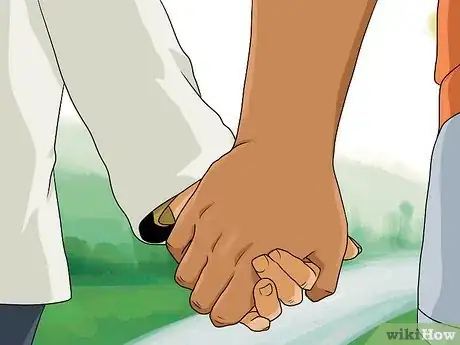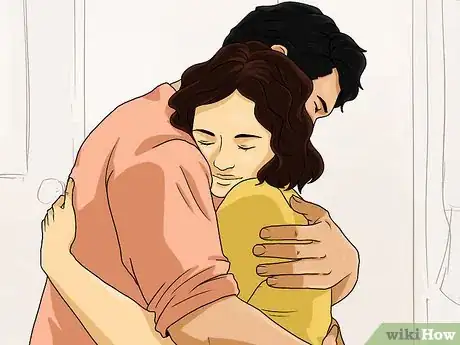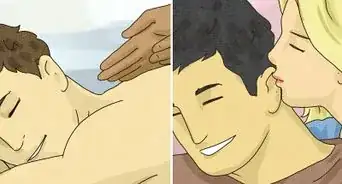This article was co-authored by Rebecca Tenzer, MAT, MA, LCSW, CCTP, CGCS, CCATP, CCFP and by wikiHow staff writer, Glenn Carreau. Rebecca Tenzer is the owner and head clinician at Astute Counseling Services, a private counseling practice in Chicago, Illinois. With over 18 years of clinical and educational experience in the field of mental health, Rebecca specializes in the treatment of depression, anxiety, panic, trauma, grief, interpersonal relationships using a combination of Cognitive Behavioral therapy, Psychodynamic therapy, and other evidence-based practices. Rebecca holds a Bachelor of Arts (BA) in Sociology and Anthropology from DePauw University, a Master in Teaching (MAT) from Dominican University, and a Master of Social Work (MSW) from the University of Chicago. Rebecca has served as a member of the AmeriCorps and is also a Professor of Psychology at the collegiate level. Rebecca is trained as a Cognitive Behavioral Therapist (CBT), a Certified Clinical Trauma Professional (CCTP), a Certified Grief Counseling Specialist (CGCS), a Clinical Anxiety Treatment Professional (CCATP), and a Certified Compassion Fatigue Professional (CCFP). Rebecca is also a member of the Cognitive Behavioral Therapy Society of America and The National Association of Social Workers.
There are 10 references cited in this article, which can be found at the bottom of the page.
This article has been viewed 12,677 times.
Relationships can be hard to navigate, even when you both care for one another a lot. If you think you might be pushing your boyfriend away, the next steps are figuring out how and why you’re doing it so that you can make a plan to bridge the gap. People push loved ones away—often without even knowing it—for many reasons, including personal insecurities and issues with past partners.[1] Here, we’ll help you figure out how you can stop pushing your boyfriend away and start a new, happier chapter with him instead.
Steps
References
- ↑ Rebecca Tenzer, MAT, MA, LCSW, CCTP, CGCS, CCATP, CCFP. Clinical Therapist & Adjunct Professor. Expert Interview. 19 August 2020.
- ↑ https://www.ncbi.nlm.nih.gov/books/NBK559106/
- ↑ Rebecca Tenzer, MAT, MA, LCSW, CCTP, CGCS, CCATP, CCFP. Clinical Therapist & Adjunct Professor. Expert Interview. 19 August 2020.
- ↑ https://www.psychologytoday.com/us/blog/the-freedom-change/201504/fear-intimacy-and-closeness-in-relationships
- ↑ https://www.helpguide.org/articles/mental-health/cultivating-happiness.htm
- ↑ https://www.psychologytoday.com/us/blog/the-freedom-change/201504/fear-intimacy-and-closeness-in-relationships
- ↑ https://www.helpguide.org/articles/relationships-communication/relationship-help.htm
- ↑ https://www.loveisrespect.org/resources/getting-what-you-want-need-from-your-relationship/
- ↑ https://www.psychologytoday.com/us/blog/the-squeaky-wheel/201905/5-habits-are-likely-push-partner-away
- ↑ https://www.loveisrespect.org/resources/respecting-your-partners-boundaries/
- ↑ https://www.loveisrespect.org/resources/creating-boundaries-in-romantic-relationships/
- ↑ Rebecca Tenzer, MAT, MA, LCSW, CCTP, CGCS, CCATP, CCFP. Clinical Therapist & Adjunct Professor. Expert Interview. 19 August 2020.
- ↑ https://www.psychologytoday.com/us/blog/the-freedom-change/201504/fear-intimacy-and-closeness-in-relationships
- ↑ Rebecca Tenzer, MAT, MA, LCSW, CCTP, CGCS, CCATP, CCFP. Clinical Therapist & Adjunct Professor. Expert Interview. 19 August 2020.
- ↑ Rebecca Tenzer, MAT, MA, LCSW, CCTP, CGCS, CCATP, CCFP. Clinical Therapist & Adjunct Professor. Expert Interview. 19 August 2020.
- ↑ https://www.apa.org/topics/psychotherapy/understanding
- ↑ Rebecca Tenzer, MAT, MA, LCSW, CCTP, CGCS, CCATP, CCFP. Clinical Therapist & Adjunct Professor. Expert Interview. 19 August 2020.






































































